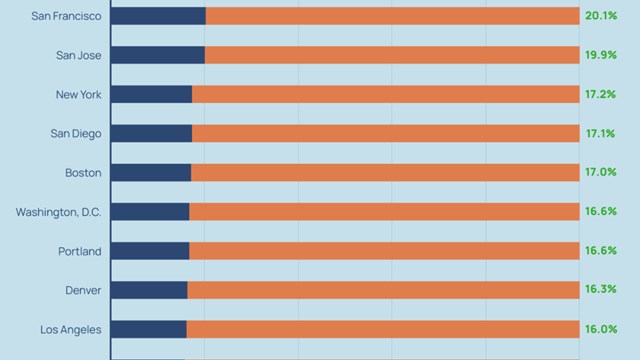They don’t call it “the bottom line” for nothing. When all is said and done, pretty much everything in business (okay, pretty much everything, period) comes down to money. In most business situations, a chief executive officer or a company president has the final word on money matters; the association or residential co-op business model dictates that fiscal responsibilities are shared between a building’s board and its managing agent. This complex relationship demands that managers embrace understanding, communication, and serious patience when it comes to a building’s money matters.
A Learning Curve
The major difference between how Fortune 500 companies and residential co-ops and condos govern their finances lies in the fact that the major decision makers in a co-op or condo are often less-than-qualified to do the job. Of course, anyone with an investment in a building has a right to speak on any matter affecting that investment, but that doesn’t mean they actually know what they’re talking about. A board might be made up of a veterinarian, a homemaker, a musician, and a serial vacationer—sounds like a fun group, but one fit to make major financial decisions? Not so much.
“The concept of volunteer representation creates a need for a learning curve in many instances,” says Stephen Beer, a partner at Czarnowski & Beer, a Manhattan-based accounting firm that represents over 125 buildings. Beer suggests, of course, the best-case scenario is a board that has at least one member with some pertinent experience. “Financial backgrounds or business backgrounds help a lot,” he says, “but if board members are not aware of certain protocols, they’re gonna learn fast.”
Beer also points out that since boards change often, what one person learned during her tenure must be learned again by the new guy. “Since there’s frequent changeover of a board, we auditors have to make sure the processes in place continue; we need to be watchdogs to make sure the manager is doing his stuff properly, too.”
No News Is Bad News
That “stuff” is the work that the manager does to fill the gaps in the board members’ financial knowledge—and it’s no easy job.
“You have to guide them. That’s what the role of the manager is,” says Josh Prottas, president of Manhattan management company Working Realty, Ltd. “Managers have to tell the board what the expenses are expected to be and the boards have to listen—though they don’t always want to. Sometimes, a manager won’t want to present the building’s financial situation in a bad light, so he’ll soften the blow by not giving the full picture.”
Prottas believes that this is a useless strategy that only ends up causing more problems later. “The cost of fuel, water, taxes, and insurance is all going up,” says Prottas. “You can’t say: ‘We spent $30,000 on water last year, so that’s how much it will be this year.’ We’ve seen an eight- to 18 percent increase in those costs. If you’re not budgeting for a five- to 15 percent increase, you simply aren’t going to have enough money. Some managers will move along what will pass politically and they’ll get a budget rubber-stamped, but the money’s got to come from somewhere. Some buildings try to mask an increase in maintenance costs by doing an assessment, but assessment money should be used for major capital improvements or replacement of reserves.”
Developing that “true budget” is, according to the experts, the best thing a manager can do to help a building’s financial operations run smoothly. Trying to please people by giving them false good news can be disastrous—and even illegal.
“The manager has to do a good job of coming up with a true budget,” Prottas says. “He can’t just say, ‘We’ll increase this ‘x’ amount.’ He needs to take apart each component. If the manager has done that, the board then has a responsibility to the shareholders to make sure the building runs by charging the proper amount for common charges and maintenance fees.”
Prottas says that, due to skyrocketing fuel costs, many buildings are scrambling to find the money to pay the bills. “They’re getting revenue from reserve funds and counting on flip taxes,” he says. “Management has to do a better job of creating a true budget, not just one that will pass politically. About 60 percent of buildings had increases of eight to nearly 50 percent in maintenance or condo charges because we presented each of our properties with an actual budget. Managers are hesitant to do that because they look bad, but tax, insurance, and fuel costs are things that we simply can’t control.”
Sam Irlander, president and CEO of Manhattan-based management firm Parker Madison Partners Inc., reminds managers that they must fully disclose financial matters and provide the best guidance they can to their boards—and not only because it’s the right thing to do. “You have to constantly remind the association manager that their role is that of a responsible fiduciary person,” says Irlander. “They can be held liable for misappropriation of funds. Managers can be sued in class action suits by shareholders or unit owners if they’re misappropriating funds. Believe me, that gets them listening.”
No Perfect Solution?
The only way full disclosure of money matters can happen is via fearless communication—and the best way to keep the fear factor down is by opening up those lines of communication loud and clear. Another good mantra when it comes to manager/board financial discussion might be “early and often.” This way, whether you’ve got a board given to spending too much too soon, or one that holds on to their purses with a vice grip, nothing will be too much of a surprise.
For the board given to wasteful spending, Irlander says open, communicative managers can help a board understand why they ought to be more judicious.
“Advise them that as a result of poor spending, all they’re going to have to do is be more fiscally responsible in the future. Maintenance costs will have to exceed the current common charges and fees. If the range of the per square foot charge is $1.65 to $2.10 per square foot, when the maintenance costs go up, then the cost goes up when they want to sell units. Buyers will want to know why maintenance is so high, and then they’ll start [apartment hunting] somewhere else. So the building that spends poorly or unwisely is only eating into its own equity. The market won’t bear the cost increases they’ll incur and it will hinder their ability to get the appropriate purchase price for the property in the future.”
As for the board who won’t spend a dime? According to Beer, that’s an entirely different kind of headache.
“These boards do exist,” says Beer. “What happens first is that the managing agent will utilize clout over vendors and convince contractors to allow the building to carry more of an outstanding balance than they should. The cash balance is going to come down first, and then accounts payable. Inevitably, maintenance will need to be done and it won’t get done. It gets out to the owners at some point that the units are not being taken care of and eventually, the board is replaced. Now the new board has to impose double-digit increases in order to catch up and take care of deferred maintenance.”
The “early and often” communication style does work here, though Beer points out that, due to the final decision-making power of the board, a manager can find his or her hands tied.
“The manager can only bring the horse to water,” he says. “An agent may feel loyalty to the board and doesn’t want to get fired, so they do their best in this kind of situation. But pay now, or pay later—you still end up paying. A board that tries never to spend money might find some core savings, but 85 percent of costs simply can’t be controlled. You’ve got labor union costs, energy taxes, mortgages, and staff costs, among others. There’s just not much you can do to change this stuff.”
Beer says that for a manager dealing with a stingy board, communicating the options available and the reality of necessary costs is pretty much all you can do. “Watch every expense to the letter to keep costs down,” he says, “or have staff do tasks you might otherwise contract out.”
Reality Bites
The hard truth is that it costs a lot of money to keep a co-op or an HOA running. A manager’s job is to make sure that the board (blessed with accountants, contractors, lawyers or not) understands these costs and the options they have for navigating them. The other hard truth is that costs are going up, plain and simple.
“We used to see a third of a budget used for energy,” says Beer. “Now, 85 to 90 percent of building budgets are being taken for energy costs. Managers and boards must react before the end of year to avoid a deficit statement. We’re making sure for audits that boards have a surplus in their budget for this, or they’ll have to do a maintenance fee increase. And these energy costs are going into everything—the guy doing plumbing is going to add a surcharge for the fuel it takes to get him there. Material costs are going up significantly, too. We saw a seven to 10 percent increase in 2004 and 2006; it dropped to four to seven percent in 2007-2008, but that’s not going to cut it this year—we’ll see it go back up to between seven and 10 percent to cover costs.”
“Boards often don’t anticipate or allow a margin for anything to happen out of the ordinary,” adds Prottas, who suggests that managers who desire a smooth financial relationship with their boards must think ahead. “Budgets are usually created for the ideal situation, but no building will actually run on that budget because it hasn’t left enough room for rising maintenance or legal fees, which are all-too-frequently underfunded. Some boards will include a blanket fee for an engineer or lawyer, but when all is said and done, these unexpected, unplanned for costs can and will break the budget.”
“The job of a property manager is to not only help the building to put themselves into good fiscal health, but to help them create budgets that put them in good financial shape for the future,” says Irlander. “During the course of their employment, major capital improvements might have to be done and the building might not have budgeted for that, so the manager has a responsibility to maintain and/or improve the investment and do financing.”
And, in case there’s a board member out there reading this, we’ve got one more piece of news for you in regard to rising costs: All this brilliant financial advice you get from your manager is actually worth a lot. “Management should be paid well for what they do,” Irlander notes. “Management companies’ costs have gone up, too, but it’s been a while since we’ve seen a pay increase for managers.”
We suggest a line item in your next budget.
Mary Fons is a freelance writer and a frequent contributor toThe Cooperator.







Leave a Comment